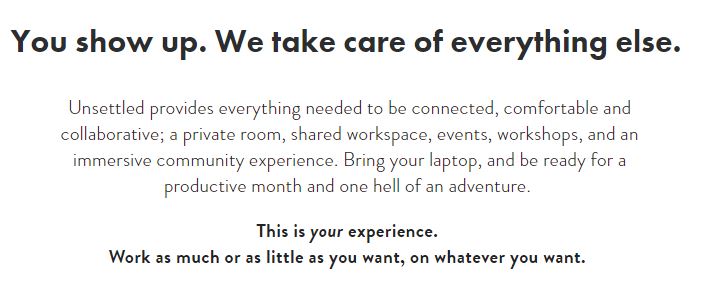So the New York Times recently wrote about the digital nomad life — an article I looked forward to reading as soon as I read the headline (“The Digital Nomad Life: Combining Work and Travel”).
It’s rare to be disappointed by a name as highly regarded as the New York Times, but I was. The article starts by mentioning a start-up (Unsettled) that’s made a name for itself by offering month-long ‘experiences’. As if being a digital nomad was a thing to experience, like salsa dancing or a football camp. The article barely talks about any digital nomads not enrolled in a program, and misleads people into thinking these new programs are how digital nomads are made.
A screenshot of the Unsettled promise, from their website.
Unsettled‘s product is compelling — $1,600 to $2,400 US for a month’s accommodation in a private room, full-time access to a co-working space, workshops, weekly meals, and other sort of get-togethers. This doesn’t include your flight, meals, alcohol, and your own travels or excursions, meaning your final tally will be more than that.
Other companies mentioned in the article have similar packages available. Nomad Cruise‘s two-week cruises start around 929 Euros, or $984 (not including airfares, on-board upgrades and a $20/day wifi charge — ironic that a trip about digital nomadism removes the digital part of the experience). Roam‘s pay-by-the-week “international network of coliving spaces” start at $500 a week for a furnished private room and co-working space with all utilities included (which goes to $850 a week if you’re dead-set on being in the heart of London). (I’m a bit surprised Hacker Paradise and RemoteYear weren’t mentioned here, though after missteps like this I’d be hesitant to mention RemoteYear as well..)
So it’s clear, I have zero doubt that a reasonably intelligent person could put something together for a fraction of the costs. I’ve done it myself several times. That’s not the point I’m trying to make.
Being a digital nomad isn’t about being coddled or having a prescribed experience. It’s about choosing how you want to live your life.
Becoming a digital nomad cannot and should not be regarded as a packaged experience, or a guided tour through the supposed banalities of the nomad life. Having everything handed to you makes you reliant on the hand that feeds you. At best it ends up being a crutch, and at worst you’re too easily sheltered from the locals and culture you ostensibly came to see.
It’s also not about being coddled. Babies are coddled. You (hopefully) are a fully-grown adult. If you want all the grunt work done for you while you focus on the things you choose to do, perhaps it’s time to move back in with your parents.
Should you become a digital nomad? This is not a test — or a trick question.
The article correctly mentions a confluence of factors: cheaper flights, better technology, and what it calls “a changing job market”. More traditional employers are allowing employees to work remotely, while the number of freelancers and entrepreneurs are as high as ever. You hear about the nomads in your life, and might think ‘Can I do that?’. Programs like this are tempting to think of as ‘tests’ — a chance to try working for yourself, working remotely, or starting a new thing while in a supportive cocoon.
This is not a test. Becoming a digital nomad, perhaps, is the beginning of a new chapter in life, and one that you can’t get all the answers for beforehand. That’s life — for all its mess and cruft, no one has all the answers.
But let’s say you join the program and invest a chunk of change in the program, the flight, etc…
You now have two lives to think about — your life here and your life back at home.
While you’re under the belief your digital nomad journey is a temporary one, are you able to put everything back ‘home’ aside? What’s happening with your spouse, boyfriend, girlfriend, kids, cats, dogs, and friends? It’s really hard to be in two places at once, even in this day and age.
You don’t have to ‘apply’ to be a digital nomad. You choose to be one.
As you’re on these sites looking at their programs, you quickly realize these companies don’t have a ‘book now’ or ‘buy now’ call to action. It’s ‘apply now‘. For the privilege of joining a Nomad Cruise, there’s a 20-question application to fill out. They certainly have an incentive to understand who’s coming, since it makes a difference with the social dynamic and they don’t want to let just anyone in…
With that said, you choose to become a digital nomad. This isn’t like when you applied to go to college or applied for a job. There is no gatekeeper on the digital nomad world, just you. You won’t feel ready (no one ever is), and the first little while is a struggle (what size SIM card do I need again?). But if you have a laptop, a WiFi connection and a Tep Wireless antenna, your sorted.
You can still do this on a trial basis, of course. Get a place on Airbnb or stay with a friend. Get a SIM card on your own, with the power of your own research. Learn to embrace the changes.
Digital nomads need support and networks. Find them and make them on your terms.
It’s one of our most needs as humans to connect and find help. That’s why I pre-network where I can, joining Facebook groups or looking for friends of friends already in the area. Meetups are great, and meeting other bloggers and locals in the area is better. The wider the group, the more help they can be — and the more people you can offer to help. The day will come when you’re giving more help than you’re getting, and that’s a thrilling place to be in!
Embrace the uncertainty.
Comments open as always.
Like this post? Like the Facebook page!


